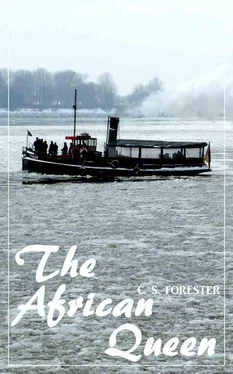Rose tried to persuade herself that this damage done to the holy cause was a worse sin than being instrumental in Samuel’s death, but she could not succeed in doing so. From childhood she had been taught to love and admire her brother. When she was only a girl he had attained the wonderful, almost mystic distinction of the ministry, and was invested in her eyes with all the superiority which that implied. Her very father and mother, hard devout Christians that they were, who had never spared the rod in the upbringing of their children, deferred to him then, and heard his words with respect. It was solely due to him that she had risen in the social scale over the immeasurable gap between being a small tradesman’s daughter and a minister’s sister. She had been his housekeeper and the most devoted of his admirers, his most faithful disciple and his most trusted helper for a dozen years. There is small wonder at her feeling an un-Christian rancour against the nation who had caused his death.
And naturally she could not see the other side of the question. Von Hanneken, with no more than five hundred white men in a colony peopled by a million Negroes of whom not more than a few thousand even knew they were subjects of the German flag, had to face the task of defending German Central Africa against the attacks of the overwhelming forces which would instantly be directed upon him. It was his duty to fight to the bitter end, to keep occupied as many of the enemy as possible for as long as possible, and to die in the last ditch if necessary while the real decision was being fought out in France. Thanks to the British command of the sea he could expect no help whatever from outside; he must depend on his own resources entirely, while there was no limit to the reinforcements which might reach the enemy. It was only natural, then, that with German military thoroughness he should have called up every man and woman and child within reach, as bearers or soldiers, and that he should have swept away every atom of food or material he could lay his hands on.
Rose saw no excuse for him at all. She remembered she had always disliked the Germans. She remembered how on her first arrival in the colony with her brother German officialdom had plagued them with inquisitions and restrictions, had treated them with scorn and contempt, and with the suspicion which German officials would naturally evince at the intrusion of a British missionary in a German colony. She found she hated their manners, their morals, their laws, and their ideals—in fact Rose was carried away in the wave of international hatred which engulfed the rest of the world in August 1914.
Had not her martyred brother prayed for the success of British arms and the defeat of the Germans? She looked down at the dead man, and into her mind there flowed a river of jagged Old Testament texts which he might have employed to suit the occasion. She yearned to strike a blow for England, to smite the Amalekites, the Philistines, the Midianites. Yet even as the hot wave of fervour swept over her she pulled herself up with scorn of herself for day-dreaming. Here she was alone in the Central African forest, alone with a dead man. There was no possible chance of her achieving anything.
It was at this very moment that Rose looked out across the veranda of the bungalow and saw Opportunity peering cautiously at her from the edge of the clearing. She did not recognize it as Opportunity; she had no idea that the man who had appeared there would be the instrument she would employ to strike her blow for England. All she recognized at the moment was that it was Allnutt, the Cockney engineer employed by the Belgian gold-mining company two hundred miles up the river—a man her brother had been inclined to set his face sternly against as an un-Christian example.
But it was an English face, and a friendly one, and the sight of it made her more appreciative of the horrors of solitude in the forest. She hurried on to the veranda and waved a welcome to Allnutt.
Allnutt was still apprehensive. He looked round him cautiously as he picked his way through the native gardens towards her.
‘Where’s everybody, miss?’ he asked as he came up to her.
‘They’ve all gone,’ said Rose.
‘Where’s the Reverend—your brother?’
‘He’s in there—He’s dead,’ said Rose.
Her lips began to tremble a little as they stood there in the blazing sunlight, but she would not allow herself to show weakness. She shut her mouth like a trap into its usual hard line.
‘Dead, is ’e? That’s bad, miss,’ said Allnutt—but it was clear that for the moment his sympathy was purely perfunctory. Allnutt’s apprehension was such that he could only think about one subject at a time. He had to go on asking questions.
‘ ’Ave the Germans been ’ere, miss?’ he asked.
‘Yes,’ said Rose. ‘Look.’
The wave of her hand indicated the bare central circle of the village. Had it not been for von Hanneken this would have been thronged with a native market, full of chattering, smiling Negroes with chickens and eggs and a hundred other things for barter, and there would have been naked pot-bellied children running about, and a few cows in sight, and women working in the gardens, and perhaps a group of men coming up from the direction of the river laden with fish. As it was there was nothing, only the bare earth and the ring of deserted huts, and the silent forest hemming them in.
‘It’s like ’ell, isn’t it, miss?’ said Allnutt. ‘Up at the mine I found it just the sime when I got back from Limbasi. Clean sweep of everything. What they’ve done with the Belgians God only knows. And God ’elp ’em, too. I wouldn’t like to be a prisoner in the forest of that long chap with the glass eye—’Anneken’s ’is nime, isn’t it, miss? Not a thing stirring at the mine until a nigger who’d esciped showed up. My niggers just bolted for the woods when they ’eard the news. Don’t know if they were afride of me or the Germans. Just skipped in the night and left me with the launch.’
‘The launch?’ said Rose, sharply.
‘Yerss, miss. The African Queen. I’d been up the river to Limbasi with the launch for stores. Up there they’d ’eard about this war, but they didn’t think von ’Anneken would fight. Just ’anded the stuff over to me and let me go agine. I fort all the time it wouldn’t be as easy as they said. Bet they’re sorry now. Bet von ’Anneken done the sime to them as ’e done at the mine. But ’e ’asn’t got the launch, nor yet what’s in ’er, which ’e’d be glad to ’ave, I dare say.’
‘And what’s that?’ demanded Rose.
‘Blasting gelatine, miss. Eight boxes of it. An’ tinned grub. An’ cylinders of oxygen and hydrogen for that weldin’ job on the crusher. ’Eaps of things. Old von ’Anneken’d find a use for it all. Trust ’im for that.’
They were inside the bungalow now, and Allnutt took off his battered sun-hat as he realized he was in the presence of death. He bowed his head and lapsed into unintelligibility. Garrulous as he might be when talking of war or of his own experiences, he was a poor hand at formal condolences. But there was one obvious thing to say.
‘ ’Scuse me, miss, but ’ow long ’as ’e been dead?’
‘He died this morning,’ said Rose. The same thought came into her mind as was already in Allnutt’s. In the tropics a dead man must be buried within six hours, and Allnutt was further obsessed with his desire to get away quickly, to retire again to his sanctuary in the river backwaters far from German observation.
‘I’ll bury ’im, miss,’ said Allnutt. ‘Don’t you worry yourself, miss. I’ll do it all right. I know some of the service. I’ve ’eard it often enough.’
Читать дальше












